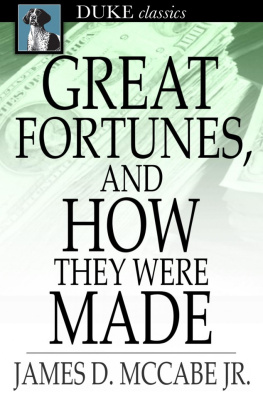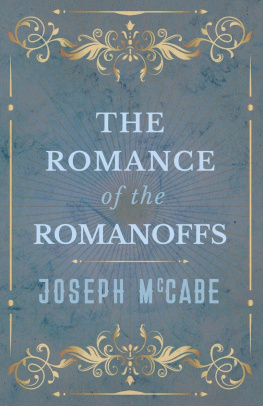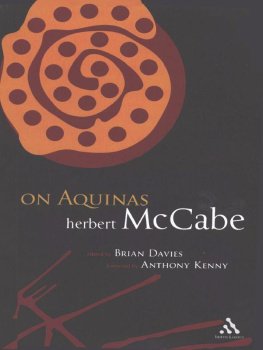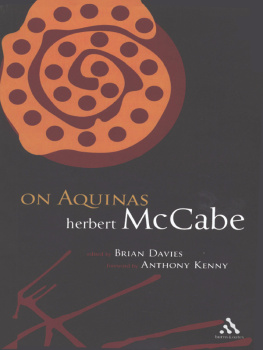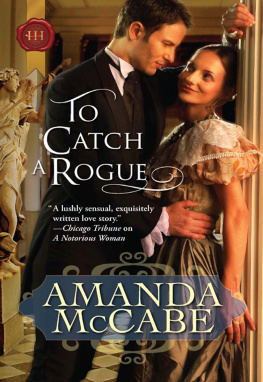GREAT FORTUNES, AND HOW THEY WERE MADE
OR, THE STRUGGLES AND TRIUMPHS OF OUR SELF-MADE MEN
* * *
JAMES D. MCCABE JR.
*
Great Fortunes, and How They Were Made
Or, The Struggles and Triumphs of Our Self-Made Men
From an 1871 edition
ISBN 978-1-62011-566-4
Duke Classics
2012 Duke Classics and its licensors. All rights reserved.
While every effort has been used to ensure the accuracy and reliability of the information contained in this edition, Duke Classics does not assume liability or responsibility for any errors or omissions in this book. Duke Classics does not accept responsibility for loss suffered as a result of reliance upon the accuracy or currency of information contained in this book.
Contents
*
*
"MAN, it is not thy works, which are mortal, infinitely little, and thegreatest no greater than the least, but only the spirit thou workestin, that can have worth or continuance."CARLYLE.
"The physical industries of this world have two relations in them: oneto the actor, and one to the public. Honest business is more really acontribution to the public than it is to the manager of the businesshimself. Although it seems to the man, and generally to the community,that the active business man is a self-seeker, and although his motivemay be self-aggrandizement, yet, in point of fact, no man ever manages alegitimate business in this life, that he is not doing a thousand-foldmore for other men than he is trying to do even for himself. For, in theeconomy of God's providence, every right and well organized business isa beneficence and not a selfishness. And not less is it so because themerchant, the mechanic, the publisher, the artist, think merely of theirprofit. They are in fact working more for others than they are forthemselves."HENRY WARD BEECHER.
Preface
*
The chief glory of America is, that it is the country in which geniusand industry find their speediest and surest reward. Fame and fortuneare here open to all who are willing to work for them. Neither classdistinctions nor social prejudices, neither differences of birth,religion, nor ideas, can prevent the man of true merit from winning thejust reward of his labors in this favored land. We are emphatically anation of self-made men, and it is to the labors of this worthy classthat our marvelous national prosperity is due.
This being the case, it is but natural that there should be manifestedby our people a very decided desire to know the history of those whohave risen to the front rank of their respective callings. Men arenaturally cheered and encouraged by the success of others, and those whoare worthy of a similar reward will not fail to learn valuable lessonsfrom the examples of the men who have preceded them.
With the hope of gratifying this laudable desire for information, andencouraging those who are still struggling in the lists of fame andfortune, I offer this book to the reader. I have sought to tell simplyand truthfully the story of the trials and triumphs of our self-mademen, to show how they overcame where others failed, and to offer therecord of their lives as models worthy of the imitation of the young menof our country. No one can hope to succeed in life merely by the forceof his own genius, any more than he can hope to live without exertingsome degree of influence for good or evil upon the community in whichhis lot is cast. Success in life is not the effect of accident or ofchance: it is the result of the intelligent application of certain fixedprinciples to the affairs of every day. Each man must make thisapplication according to the circumstances by which he is surrounded,and he can derive no greater assistance or encouragement in thisundertaking than by informing himself how other men of acknowledgedmerit have succeeded in the same departments of the world's industry.That this is true is shown by the fact that many of the most eminent menattribute their great achievements to the encouragement with which theperusal of the biographies of others inspired them at critical periodsof their careers. It is believed that the narrations embraced in thesepages afford ample instruction and entertainment to the young, as wellas food for earnest reflection on the part of those who are safelyadvanced upon their pathway to success, and that they will proveinteresting to all classes of intelligent readers.
Some explanation is due to the reader respecting the title that has beenchosen for the work. The term "Great Fortunes" is not used here todesignate pecuniary success exclusively. A few of the men whose livesare herein recorded never amassed great wealth. Yet they achieved thehighest success in their vocations, and their lives are so full ofinterest and instruction that this work must have been incomplete andunsatisfactory had they been passed over in silence. The aim of thewriter has been to present the histories of those who have won thehighest fame and achieved the greatest good in their respectivecallings, whether that success has brought them riches or not, and aboveall, of those whose labors have not only opened the way to fortune forthemselves, but also for others, and have thus conferred lastingbenefits upon their country.
In short, I have sought to make this work the story of the Genius ofAmerica, believing as I do that he whose achievements have contributedto the increase of the national wealth, the development of the nationalresources, and the elevation of the national character, though hehimself be poor in purse, has indeed won a great fortune, of which noreverse can ever deprive him.
J.D. McC., JR.
NEW YORK, 24th October, 1870.
I - MERCHANTS
*
Chapter I - Stephen Girard
*
One May morning, in the year 1776, the mouth of the Delaware Bay wasshrouded in a dense fog, which cleared away toward noon, and revealedseveral vessels just off the capes. From one of these, a sloop, floatedthe flag of France and a signal of distress. An American ship ranalongside the stranger, in answer to her signal, and found that theFrench captain had lost his reckoning in a fog, and was in totalignorance of his whereabouts. His vessel, he said, was bound from NewOrleans to a Canadian port, and he was anxious to proceed on his voyage.The American skipper informed him of his locality, and also apprised himof the fact that war had broken out between the colonies and GreatBritain, and that the American coast was so well lined with Britishcruisers that he would never reach port but as a prize. "What shall Ido?" cried the Frenchman, in great alarm. "Enter the bay, and make apush for Philadelphia," was the reply. "It is your only chance."
The Frenchman protested that he did not know the way, and had no pilot.The American captain, pitying his distress, found him a pilot, and evenloaned him five dollars, which the pilot demanded in advance. The sloopgot under weigh again, and passed into the Delaware, beyond the defenseswhich had been erected for its protection, just in time to avoid captureby a British war vessel which now made its appearance at the mouth ofthe bay. Philadelphia was reached in due time, and, as the war bade fairto put an end to his voyages, the captain sold the sloop and her cargo,of which he was part owner, and, entering a small store in Water Street,began the business of a grocer and wine-bottler. His capital was small,his business trifling in extent, and he himself labored under thedisadvantage of being almost unable to speak the English language. Inperson he was short and stout, with a dull, repulsive countenance, whichhis bushy eyebrows and solitary eye (being blind in the other) madealmost hideous. He was cold and reserved in manner, and was disliked byhis neighbors, the most of whom were afraid of him.

